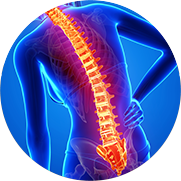Shoulder impingement syndrome is a common cause of shoulder pain. It occurs when there is impingement of tendons or bursa in the shoulder from bones of the shoulder. Overhead activity of the shoulder, especially repeated activity, is a risk factor for shoulder impingement syndrome. Examples include: painting, lifting, swimming, tennis, and other overhead sports. Other risk factors include bone and joint abnormalities.
With impingement syndrome, pain is persistent and affects everyday activities. Motions such as reaching up behind the back or reaching up overhead to put on a coat or blouse, for example, may cause pain.
Over time, impingement syndrome can lead to inflammation of the rotator cuff tendons (tendinitis) and bursa (bursitis). If not treated appropriately, the rotator cuff tendons can start to thin and tear.
What Are the Symptoms of Shoulder Impingement Syndrome?
The typical symptoms of impingement syndrome include difficulty reaching up behind the back, pain with overhead use of the arm and weakness of shoulder muscles.
If tendons are injured for a long period of time, the tendon can actually tear in two, resulting in a rotator cuff tear. This causes significant weakness and may make it difficult for the person to elevate his or her arm. Some people can have rupture of their biceps muscle as part of this continuing impingement process.
How Is Impingement Syndrome Diagnosed?
Diagnosis of impingement syndrome begins with a medical history and physical exam by your doctor. X-rays will be taken to rule out arthritis and may show changes in the bone that indicate injury of the muscle. Bone spurs or changes in the normal contour of the bone may be present.
How Is Shoulder Impingement Syndrome Treated?
Oral anti-inflammatory medications — such as aspirin, naproxen, or ibuprofen, remain the most common treatment for impingement syndrome.
The medicines are usually given for six to eight weeks since it often takes that long to fully treat the problem. You should do this under the care of a doctor because these medications can cause stomach irritation and bleeding.
There is no preferred medication for this condition as response to any given medication differs from person to person. If one anti-inflammatory medication does not help within 10 to 14 days, then another one will be given until one that provides relief is found.











